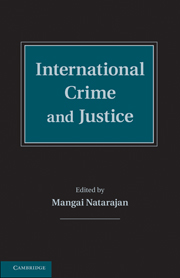Book contents
- Frontmatter
- Contents
- List of Figures
- List of Tables
- List of Contributors
- Foreword
- Preface
- Introduction
- Part I International Criminology
- Part II Law, Punishment, and Crime Control Philosophies of the World
- Part III Transnational Crime
- Part IV Organized Crime and Terrorism
- 30 Transnational Organized Crime
- 31 The Rise of Balkan Organized Crime
- 32 Russian Organized Crime
- 33 The Italian Mafia
- 34 Extortion and Organized Crime
- 35 Organized Crime in Asia
- 36 Drug Cartels
- 37 The International Implications of Domestic Terrorism in the United States
- 38 Terrorism
- Part V International crime
- Part VI Delivering International Justice
- Part VII International Cooperation and Criminal Justice
- Part VIII International Research and Crime Statistics
- Part IX International research resources
- World Map
- Index
- References
32 - Russian Organized Crime
Published online by Cambridge University Press: 05 October 2014
- Frontmatter
- Contents
- List of Figures
- List of Tables
- List of Contributors
- Foreword
- Preface
- Introduction
- Part I International Criminology
- Part II Law, Punishment, and Crime Control Philosophies of the World
- Part III Transnational Crime
- Part IV Organized Crime and Terrorism
- 30 Transnational Organized Crime
- 31 The Rise of Balkan Organized Crime
- 32 Russian Organized Crime
- 33 The Italian Mafia
- 34 Extortion and Organized Crime
- 35 Organized Crime in Asia
- 36 Drug Cartels
- 37 The International Implications of Domestic Terrorism in the United States
- 38 Terrorism
- Part V International crime
- Part VI Delivering International Justice
- Part VII International Cooperation and Criminal Justice
- Part VIII International Research and Crime Statistics
- Part IX International research resources
- World Map
- Index
- References
Summary
INTRODUCTION
Organized crime today inflicts serious harm on Russia’s economic and political development. The old Soviet Union provided fertile ground for the growth of organized crime, but the demise of the USSR in 1991 has seemingly provided even more opportunities for organized criminal networks. These latter day Russian groups are more sophisticated than their predecessors, and have extended their spheres of influence worldwide. In the U.S., for example, Russian crime groups are involved in a host of criminal operations that are causing a significant degree of harm.
In this discussion we want to do several things. The first is to explain which groups are defined as being Russian organized crime (ROC). Next, we will provide an historical account of ROC – a history that lays the foundation for the current organized crime situation in Russia, the U.S., and elsewhere. Thirdly, we will discuss some of the methods used to combat organized criminal networks and make a few policy recommendations.
DEFINING ROC
In order to begin to have an understanding of ROC, we must be clear about what groups are encompassed by the term “Russian.” A popular misconception is that all criminal groups which are classified as being “Russian” are actually from Russia. In fact, this label has been applied broadly to groups of criminals from any of the fifteen former republics that made up the Soviet Union, including Armenia, Georgia, Ukraine, Moldova, and others (Finckenauer & Waring, 1998). Essentially, what is often called Russian organized crime is not strictly Russian.
- Type
- Chapter
- Information
- International Crime and Justice , pp. 247 - 254Publisher: Cambridge University PressPrint publication year: 2010



